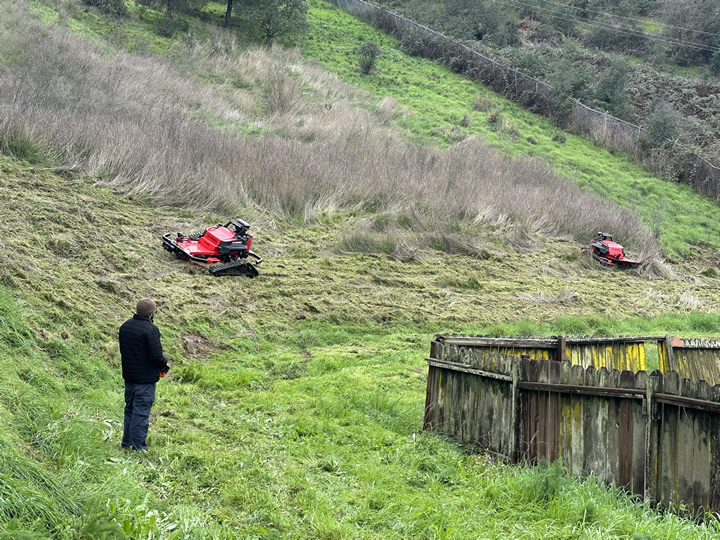From Labor-Intensive to Landscaping-Innovative: How Remote-Operated Mowers Transform Slope Challenges

Landscape maintenance is a difficult and demanding profession, and it’s not often associated with modern technology and innovative automation.
But nothing could be further from the truth.
Safety has always been a concern landscaping professionals face. Since 2011, there have been more than 1,000 work-related fatalities in the landscaping industry, with 142 deaths recorded in 2021 alone. Protecting workers from injury and companies from devastating professional and financial liability has led to many of the industry’s leading technological advancements.
The industry is also facing labor shortages that have driven innovation. These shortages were already being felt as the Baby Boomers began retiring but accelerated in 2020 after the COVID-19 pandemic created labor disruptions. According to a National Association of Landscape Professionals (NALP) survey, nearly 80% of landscaping companies struggle to fill their open positions.
In response to these persistent problems, the landscaping industry looked toward technology to solve its biggest challenges both on and off the field. Enter the evolution of robotic and remote-controlled mowing solutions.
Workplace Safety and Improved Working Conditions
One of the most challenging issues landscaping professionals face on the jobsite is the process of slope mowing. Even in the flattest of locations throughout the country, crews still face steep slopes, particularly on commercial and government-owned land.
Landscapers also face an increased risk of rollovers due to the uneven terrain of steep slopes, and they find it difficult to maintain control of their mowers while navigating around various obstacles. They often also need specialized equipment to finish the task of slope mowing. And working steep, uneven terrain with string-trimmers is highly inefficient and frequently leads to falls and injuries.
This is the reason many commercial landscaping outfits have turned to remote-controlled mowers. These robotic mowers have a low center of gravity, are built using heavy-duty construction, and allow the operators to mow dangerous areas from a safe distance. This can include everything from steep slopes, retention ponds and containment berms to other extreme landscapes where other mowers fear to go.
The remote-controlled mower often improves working conditions for a company’s existing employees, too. Rather than having to overwork these employees or put them in harm’s way to clear vegetation from dangerous locations, you can put your most dependable and talented personnel to work handling more delicate and creative landscaping needs.
This improves morale and allows your employees to better develop their landscaping skills.
Taming Wild Vegetation Growth
While operating a more efficient landscaping company and addressing the ongoing labor shortages are the most positive aspects of running remote-controlled mowers, they also provide a pleasing outcome for the client.
Just a few short years ago, in order to clear grass and other vegetation from steep slopes and marshy areas, customers had to pay landscaping companies for several workers to stand on the slope and cut it using trimmers. Most mowers couldn’t handle these areas safely.
That meant that landscapers would have to find and pay for the additional manpower to stand in these undesirable areas for hours in order to clear out the obstructive vegetation. For the customer, it meant paying a lot more to fund these additional workers or putting off cutting these areas for longer periods of time to save money.
Since these durable mowers can access some of the toughest terrain without complaint or the risk of injury, commercial customers can keep their properties looking neat, more manageable and safer.
Efficiency in the Workplace
Most people see innovation as a positive step, while others see it as a complication that leads to job loss. But in the landscaping industry, the arrival of remote-controlled mowers simply fills a labor shortage problem that commercial landscapers have faced for more than a decade and counting.
These mowers:
- Require fewer operators to complete a job
- Utilize premium camera system optics for outstanding visibility and safety
- Feature a smart and instantly intuitive remote-control unit with a range of up to 1,000 feet
Because these mowers are engineered to transform working conditions for your crew, they allow your company to work steep and hazardous terrains while keeping your employees safe on solid ground. And they also reduce your reliance on the already shallow labor pool—one operator with a remote-operated robotic mower can replace a string-trimming team of seven and get the job done in a fraction of the time.
For most landscaping companies, mowing is the most time-consuming but least profitable task they offer. But, by using a remote-controlled mower, your company can take on the hard tasks of mowing hazardous terrain and allow you to land high-paying, niche work.
This not only improves your return on investment (ROI), it provides your landscaping company with the ability to meet customer demands with fewer workers. This makes it easier for you to scale your businesses for growth.
Necessity is often the mother of invention, and nowhere is that more true than in the robotics and remote-controlled mowers’ world. Reducing injury, facing the labor shortage, and allowing your team the ability to offer niche mowing services help you scale your business for growth while meeting customer needs.
As Vice President of Sales and Marketing for RC Mowers, Tim Kubista specializes in revenue growth, acquisition, sales training and building dealer networks for the company. He has had three companies on the Inc. 5000 list and came to RC Mowers with a vast knowledge of the commercial mowing industry. For more information about RC Mowers, visit www.rcmowersusa.com.
Comments (0)
This post does not have any comments. Be the first to leave a comment below.
Featured Product

